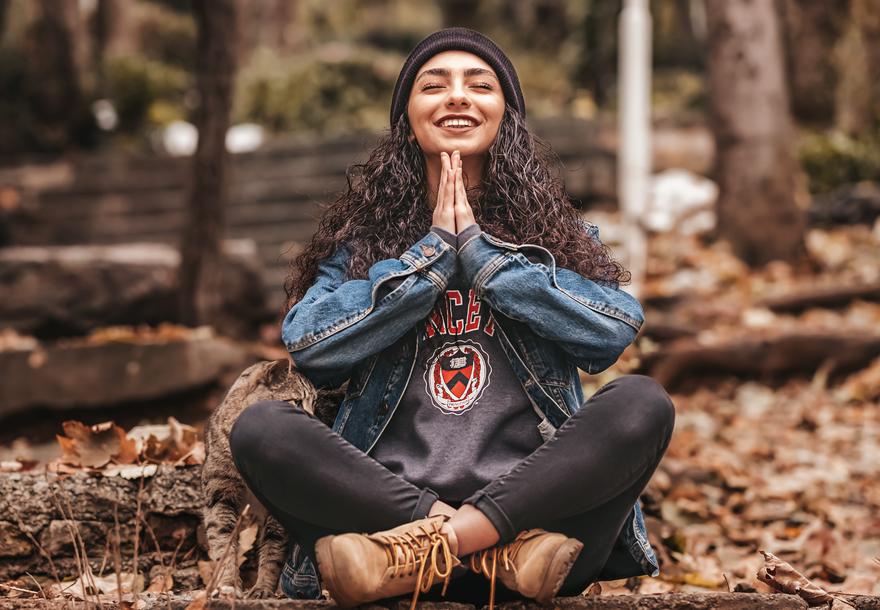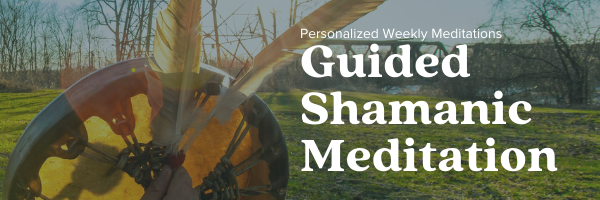Develop a Meditation Practice For Deeper Connection

Video transcript below
MEDITATION! That word is very popular and we are all told we need to master it. So, how can you develop a meditation practice no matter whether you are just starting out as a beginner or already at an advanced level? Whether you're a beginner, an intermediate, or an advanced meditator, there are many different ways to develop a meditation practice. And I wanted to discuss where you might start as a beginner, explain what the different levels are, and also the overview of meditation. I think that a lot of people aspire to meditate, and some people do regular meditation. Yet a high percentage % of people don't feel like they have time for it or find it hard to get into it. I will be honest, it is kind of difficult to start, and when you first start meditation, it is hard. It truly is.
There's a level of difficulty to tame the mind and get into more of a contemplative space. So let's start with the two main types of meditation. There are lots of variations and you've probably heard them all: transcendental meditation, zen meditation, breath meditation, guided visualizations, Kelee meditation, and more. There are so many different types. I think they really come down to two main strands.
1. Vipassana meditation is all about silence and stillness and breath and not really doing anything but focusing on the space, and the silence and the stillness. That's actually quite a hard meditation to get into when you're new. I would never give that to a beginner.
2. The second type of meditation is Somata, which is more a guided visualization or a reflected journey or there's an active component of you traveling somewhere, going somewhere, or doing something.
Let us talk about beginners. If I was a beginner meditator, or at least rusty, and needed to get back into it after having a time out of it, I would start with some very simple meditations, no more than 10 minutes in length. To be honest, I think if you're a beginner it's hard to hold focus for more than 8 or 9 minutes. I would start with a guided meditation around feeling your body, feeling your senses, feeling your temperature, feeling your skin, feeling the air, feeling the temperature of the outside world versus your body. I'd start to engage the senses; hearing, smell, taste. And then I might put some additional components in.
A beginner meditation might include a guided journey about light or the ocean or sky or clouds or something sort of quite simple or easy to conjure up in your mind. And the other thing I would implement is a bit of breathwork. Take some deep breaths in, then take some deep breaths out. But I would never give a meditator at the beginning of their journey an instruction like "Just do breathing for 10 minutes." I think that would be really quite torturous, especially if you've got a busy mind. I've got some meditations that are simple and easy for beginners. And when I say simple, they're not unenjoyable, they're just kind of simple concepts to start to train your monkey mind.
The intermediate style of meditation would be a more complex guided journey. I do that a lot with my delivery of meditations. I like to guide someone through a natural landscape. That's how I've been taught. I think it's effective. So more intermediate or beyond beginner would be, "Let's start to visualise yourself through a cave, a forest, an ocean or water or whatever natural feature." I think that's a beautiful way to do it, but it can also just be a meditation about space or time or a house or anything like that. When you're beyond that beginner phase, you can start to travel inside the body too. You can start to feel your blood or your heart, or you can even visit an organ and feel into it and sense emotion and feelings. So it's almost like you can go inward to the body. You could start to do some kind of mantra work.
Transcendental meditation is popular. I've never really specialised in that meditation style, but holding the mantra, having a theme or a mantra would be really great for the next level up. That's more of an intermediate meditation, and maybe starting to get more into the breath, and space, and stillness. And maybe implementing into your meditation routines somewhere where you can practice just being still and breathing, and maybe just listening to the ocean if you're sitting on a beach, or the birds if you're sitting outside.
Then you get into what I call 'advanced meditation'. And that is powerful. I would say that once you're in advanced you almost just guide yourself into it. Yes, it's beautiful to have delivered meditations for you also, and I record a lot of 20-minute or 15 or 25-minute meditations where there's a long guided complex journey with lots of symbolism. And by the way, I'm not saying that a beginner couldn't do a symbolic journey; it's just harder for them at the start. So it's almost like you'd sit down and guide yourself. "What kind of meditation do I want to do today?" I've meditated for a lot of years now, so I might go down to the beach and just decide to meditate on a word or a colour or a feeling, and then let my mind take me deeper into it. My meditation will just let me go to the next level. I might start with a word like, "I want to feel positive today," and then I'd go, "How does that feel in the heart?" and "What words would be linked to positivity?" and "Where can I see positivity in the ocean around me?" Or, "What colour is positivity? What shape is it?" I could take myself on a great journey with just that concept. Or I might just want to sit there and listen to my heartbeat and just hear the rhythm and the internal breath. Or I might decide to listen to or guide myself, either/either, but listen to a strong, complex, rich journey where I'm through mountains and waters and jungles and canyons and temples. Or I might want to feel myself morph into an animal. The other thing about advanced meditation, and I really want to make this point because I've written this down particularly.
You can actually do more self-healing on the body when you're more advanced. You can actually travel to that organ and then give it healing, or you can ask your body what it wants. Or you can start to get really, really rich, and in-tune with your inner self. And I think that's the whole point here. It's about stopping, being still, and calming, but it's also about being in tune, and it's about being able to go in and make energy-field corrections, pacify emotions, let stuff go, release things from the body. There's a great, great meditation visualisation where you shrink down some sort of disease or issue or pain to a little marble-sized object or smaller, and then expel it out, or let it go into the water, then gas and the gas leaves your body. So you can start to be really proactive and start to do self-healing and self-work and self-reflection. You can ask for answers, you can get messages. You can start to do that in the intermediate stage as well, but I think what I'm trying to say is is that there are stages of what is possible, and the idea is you want to train your mind visually, auditory, kinesthetically; train all those parts of you to drop into a deeper state where your mind's not just running the show. So if you're a beginner, start with those basic, simple, feel my body style meditations. If you're intermediate, get into more complex journeys, and if you're advanced, start playing around with what you can do to actually heal. Hope that makes sense.
I've got meditations for all three areas, so I might put some links underneath this video, and, yeah. Enjoy those meditations.
Guided Shamanic Meditation: An 8-week Member's Series
A member's series providing you personalized meditations for your day-to-day life. This is a great regular practice to do and keep you in flow. The time commitment is deep in quality but should not eat up too much of your time. Access here
Categories
- world news (6)
- numerology updates (11)
- energy update (14)
- nature healing (12)
- goals (16)
- personal development (40)
- body health (16)
- consciousness (31)
- conscious living (72)
- mindfulness (39)
- confidence (25)
- death and rebirth (4)
- values (26)
- higher self (29)
- life purpose (27)
- animal totem (1)
- stress management (23)
- conscious children (2)
- chakra energy (4)
- spiritual retreat (9)
- work-life balance (13)
- happiness (31)
- workshop and retreats (15)
- spirituality (17)
- astrology (5)
- space clearing (9)
- relationships (19)
- intuition (20)
- clarity (14)
- wellness (22)
- meditation (4)
- earthing (2)
- intuitive guidance (20)
- relationship guidance (11)
- healing tools (9)
- mental clutter (3)
- fear (3)
- rezinate sessions (1)
- spiritual awakening (2)
- energy medicine (6)
- self healing (2)
- metaphysical energy and healing (5)
- medicine wheel journey (2)
- psychic development (13)


0 comments
Leave a comment